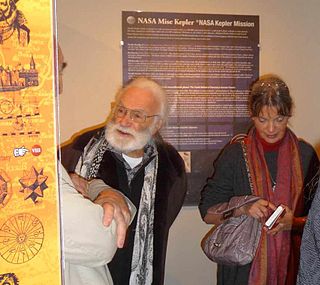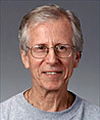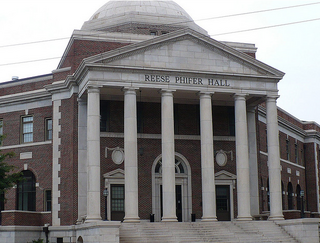
Karl H. Pribram was a professor at Georgetown University, in the United States, an emeritus professor of psychology and psychiatry at Stanford University and distinguished professor at Radford University. Board-certified as a neurosurgeon, Pribram did pioneering work on the definition of the limbic system, the relationship of the frontal cortex to the limbic system, the sensory-specific "association" cortex of the parietal and temporal lobes, and the classical motor cortex of the human brain. He worked with Karl Lashley at the Yerkes Primate Center of which he was to become director later. He was professor at Yale University for ten years and at Stanford University for thirty years.
Uses and gratifications theory is a communication theory that describes the reasons and means by which people seek out media to meet specific needs. The theory postulates that media is a highly available product, that audiences are the consumers of the product, and that audiences choose media to satisfy given needs as well as social and psychological uses, such as knowledge, relaxation, social relationships, and diversion.
Media psychology is the branch and specialty field in psychology that focuses on the interaction of human behavior with media and technology. Media psychology is not limited to mass media or media content; it includes all forms of mediated communication and media technology-related behaviors, such as the use, design, impact, and sharing behaviors. This branch is a relatively new field of study because of advancement in technology. It uses various methods of critical analysis and investigation to develop a working model of a user's perception of media experience. These methods are used for society as a whole and on an individual basis. Media psychologists are able to perform activities that include consulting, design, and production in various media like television, video games, films, and news broadcasting. Media psychologists are not considered to be those who are featured in media, rather than those who research, work or contribute to the field. Mediacology is a new term used as a collaborative word of Media and Psychology.
John E. Exner, Jr., born in Syracuse, New York, was an American psychologist. He received a BS and an MS degree in psychology from Trinity University and a PhD in clinical psychology from Cornell University in 1958. From 1968 to 1969 he served as a director for the East Asia/Pacific and North Africa, Near East, South Asia Regions of the Office of Selection, Peace Corps of the United States of America. Later he became a faculty member at Long Island University, where he was director of clinical training from 1969 to 1979. He became professor emeritus in 1984.
Kenneth M. Zeichner is Boeing Professor of Teacher Education and was the Director of Teacher Education from 2009 to 2013 at the University of Washington. He was the Hoefs-Bascom Professor of Teacher Education and Associate Dean for Teacher Education, University of Wisconsin–Madison. He received his Ph.D. in 1976 from Syracuse University in educational psychology and has been on the faculty at Madison since that time. He has had visiting appointments at Umeå University (Sweden), Simon Fraser University (Canada), and the University of Southern California.
Mood management theory posits that the consumption of messages, particularly entertaining messages, is capable of altering prevailing mood states, and that the selection of specific messages for consumption often serves the regulation of mood states. Mood management theory now belongs to a larger group of theoretical approaches which speak on media content and how it plays a role in mood management. Mood optimization is a current affective sate of media mood management.
Kathy Pezdek is Professor and Associate Dean of the School of Behavioral and Organizational Sciences (SBOS), Claremont Graduate University in Claremont, California. Dr. Pezdek is a cognitive psychologist specializing in the study of eyewitness memory. She frequently serves as an expert witness in the area of eyewitness identification and has testified on this topic in Federal, State and Superior Court cases. Her extensive research has focused on a range of topics related to Law and Psychology that apply to both adults and children. These topics include face memory, false memory, suggestibility of memory, lineup techniques, and detecting deception. Kathy Pezdek is a Fellow of the American Psychological Society, has served as Editor of Applied Cognitive Psychology and is currently on the Editorial Boards of the Journal of Applied Psychology and Legal and Criminological Psychology.
William Dean Crano is an American psychologist. He is the Oskamp Distinguished Professor of Psychology in the Division of Behavioral and Organizational Sciences (DBOS), Claremont Graduate University.
François Cooren is a French and Canadian communication scholar and was, from 2005 to 2008, the editor of Communication Theory. He completed his Ph.D. at the Department of communication of the Université de Montréal in 1996, under the supervision of James R. Taylor. He was chairman of that same department from 2006 to 2015, where he is full professor. Cooren also completed a postdoc at the Université de Louvain-la-Neuve, in Belgium.
Norman Henry Anderson was an American social psychologist and the founder of Information integration theory.
Reinforcement theory is a limited effects media model applicable within the realm of communication. The theory generally states that people seek out and remember information that provides cognitive support for their pre-existing attitudes and beliefs. The main assumption that guides this theory is that people do not like to be wrong and often feel uncomfortable when their beliefs are challenged. According to Luthans and Stajkovic (2009), reinforcement theory suggests that the environment and its consequences significantly influence behavior, with positive reinforcement being one of the most substantiated principles in psychology. This theory is crucial in understanding how individuals process information that aligns with their attitudes and how reinforcement can shape and sustain communication patterns.
Exemplification theory is a theory that states that an event is the exemplification of a property in an entity. This identity is often modeled as an "ordered triple" of an entity, property type, and time.
Misattribution is one of many theories of humor that describes an audience's inability to identify exactly why they find a joke to be funny. The formal theory is attributed to Zillmann & Bryant (1980) in their article, "Misattribution Theory of Tendentious Humor", published in Journal of Experimental Social Psychology. They derived the critical concepts of the theory from Sigmund Freud's Wit and Its Relation to the Unconscious, originally published in 1905. Freud declared people incapable of knowing exactly what it is they find amusing due to the complex nature of their conscious and subconscious minds. Jokes are crafted by comedians who have experience with causing laughter but who may themselves be blind to the actual cause of humor.

Robert S. Wyer Jr. is a visiting professor at the University of Cincinnati and professor (emeritus) at the University of Illinois, Urbana-Champaign. He received his doctoral degree from the University of Colorado. Wyer Jr.'s research interests cover various aspects of social information processing, including:
Affective disposition theory (ADT), in its simplest form, states that media and entertainment users make moral judgments about characters in a narrative which in turn affects their enjoyment of the narrative. This theory was first posited by Zillmann and Cantor (1977), and many offshoots have followed in various areas of entertainment. Entertainment users make constant judgments of a character's actions, and these judgments enable the user to determine which character they believe is the "good guy" or the "villain". However, in an article written in 2004, Raney examined the fundamental ADT assumption that viewers of drama always form their dispositions toward characters through moral judgment of motives and conduct. Raney argued that viewers/consumers of entertainment media could form positive dispositions toward characters before any moral scrutinizing occurs. He proposed that viewers sometimes develop story schemas that provide them "with the cognitive pegs upon which to hang their initial interpretations and expectations of characters". The basic idea of the affective disposition theory is used as a way to explain how emotions become part of the entertainment experience.

Richard M. Perloff is an American academic. He is professor of communication at Cleveland State University, where he has taught since 1979. He has written on persuasion, on political communication, on the psychology of perception of the effects of mass media, and on the third-person effect.
Jennings Bryant was Distinguished Professor Emeritus at The University of Alabama. Prior to his retirement in 2010, he was Communication and Information Sciences Distinguished Research Professor, holder of the Reagan Endowed Chair of Broadcasting, and Associate Dean for Graduate Studies and Research at UA. Jennings Bryant was married to Sara Poteat Bryant for 43 years. He and Sara were the parents of three children. The Bryants lived on a family farm in the Mountain Valley Rural Agricultural Historical District in Glenwood, North Carolina.

Lynn R. Kahle is an American consumer psychologist and Professor Emeritus at the University of Oregon's Lundquist College of Business. From 2018 to 2020 he taught at the Lubin School of Business, Pace University in New York as a visiting scholar and professor.
Çiğdem Kağıtçıbaşı was a Turkish scientist and professor. She was a university professor since 1969 and received the APA Award for Distinguished Contributions to the International Advancement of Psychology in 1993.

Dolf Zillmann is dean emeritus, and professor of information sciences, communication and psychology at the University of Alabama (UA). Zillmann predominantly conducted research in media psychology, a branch of psychology focused on the effects of media consumption on human affect, developing and expanding a range of theories within media psychology and communication. His work centred on the relation between aggression, emotion, and arousal through media consumption, predominantly in pornography and violent genres of movie and television. His research also includes the effects of music consumption, video games, and sports.





